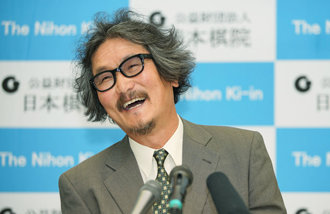Professor Diagnoses the Economy
Professor Kim Byeong-ju, an experienced professor at Sogang University and former head of Korea Economic Education Association and Korea Economic Association, is one of the most reputable economists. He set out to serve as a council member of the National Economic Advisory Council when the Roh Moo-hyun administration first came to power. In 2004, however, he lead a movement in which more than 1,000 economic and business administration scholars criticized the administrations economic policies and argued for a shift to market-friendly economic policies.
With the Korean economy showing signs of burden due to many issues such as North Koreas nuclear weapons test, Dong-A Ilbo met with professor Kim to hear his thoughts. Professor Kim conveyed his worries regarding an economic growth rate that has failed to meet the potential growth rate, a lack of corporate investment due to overreaching regulations, the nations debt, which has doubled in the last four years, and the mounting youth unemployment.
The professor pinned the blame of the administrations failed economic policies on the 386-generation politicians and civic groups including People`s Solidarity for Participatory Democracy. He said that these two groups have assumed an increasing influence on government officials and that this has led to the rise of a second government, which exceeded the powers of the original government.
Kim added, The president views government officials as potential corruption offenders. He has an undefined antipathy towards the privileged. Some of those who assist the president are not trained to look at the macro economy. Sometimes ignorance is taken for creativity. The failure of this administration was caused by the rise of the second government, which is filled with amateurs.
He criticized that the president and his 386-generation (3 refers to people in their 30s in the 1990s, 8 to the 1980s when they were enrolled at universities, and 6 to the 1960s when they were born) advisers refuse to look at the economy as it is and do not take into account the limits of time and production factors, choosing to look at virtual reality, which they have dreamed up with their ideology.
Kim also pointed out the incumbent administrations abandoned promise of an annual growth rate of seven percent.
Up till 2002, the annual growth rate of the Korean economy was at six percent. It has been only four percent since this administration came to power. Most of all, corporate fixed-investment is alarmingly low. It means that the people see uncertainty in our economy. The government must abolish regulations so that companies will make more investments and must also reduce the uncertainty they cause.
He added that the policies for the working class are working against the working class.
The act of widening the social safety net is not bad in itself. But there is no better welfare policy than increasing the number of jobs that go to the working class. Instead, the government increased the social budget to an unbearable extent, and this has led to the doubling of the national debt. The future generation will have to bear this debt. The government needs to change its mentality. It has to realize that what is good for businesses is also good for the lower income class.
When asked about the real estate market, Kim said, The thought of stabilizing the real estate market by introducing higher taxes can lead to contraction of spending among the well-to-do. Property tax affects disposable income, because it is a tax on income that has not been realized. If the high-income bracket spends less, the low-income bracket will suffer.
On North Koreas nuclear weapons test, he said, This may sound strange, but everyone was expecting it. If second and third nuclear tests follow, the economy could be affected.
When asked what he thinks the administration is doing right, Kim said, The government rightfully decided not to officially stimulate the economy. The administration should focus on the fundamentals of the economy, instead of working to win the next election.
buddy@donga.com sunshade@donga.com







